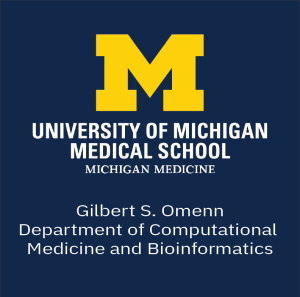Presented By: Department of Computational Medicine and Bioinformatics DCMB
Tools and Technology Seminar by Michelle Kim
“Determining the driving factors shaping genetic architecture of complex traits in recently admixed populations”

Abstract
Understanding the genetic basis of complex traits in admixed populations is challenging due to diverse genetic backgrounds, particularly for highly prevalent diseases. Misinterpreting admixture’s impact can have significant consequences for biomedical research. This study employs advanced computational biology to investigate how admixture shapes the genetic architecture of complex traits and influences GWAS outcomes. Using the forward-in-time population genetic simulator SLiM, we model trait evolution under admixture by varying the relationship between causal variant effect sizes and selection coefficients while accounting for population size changes and migration across five admixture scenarios.
Our findings reveal that GWAS power is influenced by genetic architecture and population demographic history. Traits with weak correlations between effect size and fitness (e.g., anthropometric traits) show higher GWAS power compared to traits with stronger correlations (e.g., genetic diseases). Populations with recent bottlenecks exhibit higher GWAS power, highlighting the role of rare variants. Surprisingly, fine- mapping ability remains consistent across traits. Empirical validation using data from diverse populations, including the All of Us database, supports our simulation predictions. For anthropometric traits like height, common variants exhibit moderate effects, while for traits like malignant neoplasms, rare variants show larger effects and common variants minimal effects.
By integrating population and complex trait genetics, this study provides insights into how population history shapes genetic architecture and heritability. Our findings improve understanding of genetic studies in diverse populations, enabling more accurate biomedical applications and personalized medicine strategies.
About The Tools & Technology Seminar Series
The DCMB Tools and Technology Seminar Series is held in Palmer Commons, Room 2036, each Thursday at 12pm EST. Each seminar highlights a computational tool, technology, or methodology that is under development or in current use and is of special interest to DCMB and University researchers. Presenters are U-M researchers and students.
These seminars are live-streamed and recorded and made available for future viewing via the DCMB YouTube Channel.
Understanding the genetic basis of complex traits in admixed populations is challenging due to diverse genetic backgrounds, particularly for highly prevalent diseases. Misinterpreting admixture’s impact can have significant consequences for biomedical research. This study employs advanced computational biology to investigate how admixture shapes the genetic architecture of complex traits and influences GWAS outcomes. Using the forward-in-time population genetic simulator SLiM, we model trait evolution under admixture by varying the relationship between causal variant effect sizes and selection coefficients while accounting for population size changes and migration across five admixture scenarios.
Our findings reveal that GWAS power is influenced by genetic architecture and population demographic history. Traits with weak correlations between effect size and fitness (e.g., anthropometric traits) show higher GWAS power compared to traits with stronger correlations (e.g., genetic diseases). Populations with recent bottlenecks exhibit higher GWAS power, highlighting the role of rare variants. Surprisingly, fine- mapping ability remains consistent across traits. Empirical validation using data from diverse populations, including the All of Us database, supports our simulation predictions. For anthropometric traits like height, common variants exhibit moderate effects, while for traits like malignant neoplasms, rare variants show larger effects and common variants minimal effects.
By integrating population and complex trait genetics, this study provides insights into how population history shapes genetic architecture and heritability. Our findings improve understanding of genetic studies in diverse populations, enabling more accurate biomedical applications and personalized medicine strategies.
About The Tools & Technology Seminar Series
The DCMB Tools and Technology Seminar Series is held in Palmer Commons, Room 2036, each Thursday at 12pm EST. Each seminar highlights a computational tool, technology, or methodology that is under development or in current use and is of special interest to DCMB and University researchers. Presenters are U-M researchers and students.
These seminars are live-streamed and recorded and made available for future viewing via the DCMB YouTube Channel.